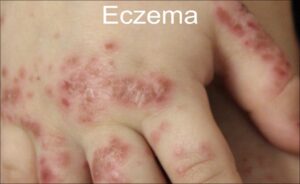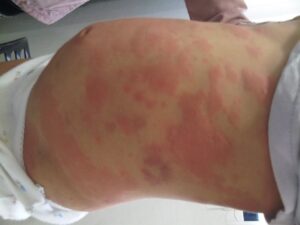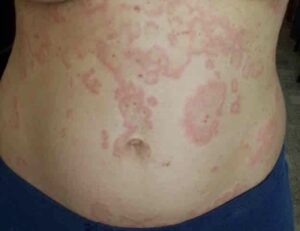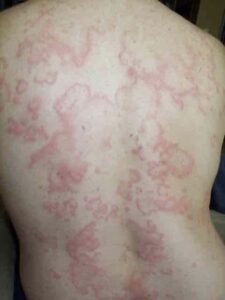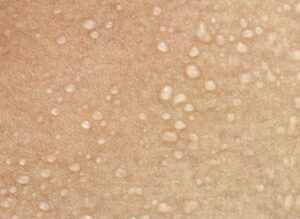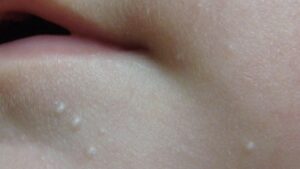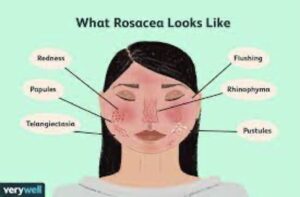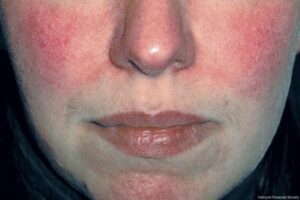What Is Your Skin Trying to Tell You? – When a rash won’t clear up and when to see a specialist.
Believe it or not, the skin is the body’s largest organ. It is made up of water, protein, fat, and minerals, and its primary functions are to 1) protect the body from foreign invaders like germs and viruses, and 2) regulate temperature. The skin, along with the hair, nails, and glands make up the integumentary system. Because the skin is such a large organ—and, of course, the most visible, how it looks and feels can tell you a lot about your overall health and wellness. When your body is triggered by something on the inside or the outside, your skin will let you know!
One common sign of concern that shows up on the skin is a rash. Many times they appear out of nowhere and it can be difficult to pinpoint the cause, determine which treatment is right for you, or if it is serious enough to see a specialist. That is what we are breaking down here. Have a look at a few different kinds of rashes, their treatments, and whether a trip to a specialist may be in order.
What Are Rashes?
First, let’s answer this: what are rashes? Rashes are abnormal changes in the color and texture of the skin, usually as a result of inflammation caused by a number of things including allergens and irritants. Treatments will vary based on the rash, and whether or not you need to schedule an appointment with a specialist can be determined by symptoms or severity. Now, let’s dive into some common rashes people experience.
Eczema
Eczema isn’t just one condition but rather a group of conditions that causes itchiness, dryness, scaly patches, and blisters to form all over the skin. There are several different types of eczema, but the most common is atopic dermatitis and it usually develops in early childhood, especially in those who have a family history of the condition. Atopic dermatitis (also referred to as atopic eczema) is, in most cases, caused by an overactive immune system trying to fend off an allergen that the body deems harmful. This causes an inflammatory response that shows up as a skin rash. Common triggers are extended exposure to dry air or extreme cold, various types of soap or shampoo, laundry detergents with chemical additives, or fragrances in candles.
Symptoms of eczema include:
- Itchiness
- Dryness and sensitive skin
- Inflammation
- Rough, scaly texture
- Oozing or crusting
Treatment options:
- Creams and ointments to ease inflammation
- Antihistamines
- Wet wraps to relieve itching
- Medications prescribed by a doctor or specialist
When should you see a specialist?
Unfortunately, there is no cure for eczema, but the next best thing you can do is see a specialist if you notice your skin flaring up, if the rashes continue to get worse, or if more serious issues surface such as muscle aches and pains or difficulty sleeping.
Urticaria
Urticaria, also known as hives, is another common skin rash and is an outbreak of red bumps or welts on the skin that appear suddenly. The swelling that accompanies the hives is called angioedema. One of the main causes of mild urticaria are allergies to certain foods, medications, infections, and sometimes insect bites. In these cases, hives usually last less than six weeks. More chronic forms of urticaria may be caused by thyroid disease, hepatitis, and some infections. In this case, major organs like the lungs, as well as the muscles can be affected.
Symptoms of urticaria include:
- Raised itchy bumps
- Swelling that turns into welts
- Welts that grow in size and spread
- Blanching (the center turns white when pressed)
Treatment options:
- Avoid hot showers or baths
- Wear loose-fitting clothing
- Antihistamines
When should you see a specialist?
You can usually treat mild cases of hives with home remedies, but if your symptoms continue for more than a few days, it is best to see a specialist. There is a chance you are reacting to a food allergy or environmental trigger and you don’t know it! In that case, an allergy specialist like Dr. Praveen Buddiga can run a full panel of allergy tests to determine the root cause. For serious reactions, seek emergency help immediately.
Miliaria
Miliaria, also known as heat rash, is another common rash that is caused by the blockage and inflammation of the sweat glands. If you are lucky enough to live in a hot or humid climate, you are more prone to this type of rash as well as complications associated with the rash like bacterial infections and impaired thermoregulation. Heat rash is caused by a number of things, but the most common are hot and humid environments, intense physical activity, fever, occlusion of the skin with non-breathable clothing, or laying in one place for too long (for example, a patient in a hospital bed). Heat rash usually shows up in skin folds where clothing rubs against the skin, around the neck, shoulders, chest, and in elbow creases as well as the groin.
Symptoms of Miliaria include:
- Inflamed bumps
- Itchiness
- Mild swelling
Treatment options:
- Cold compresses
- Cool bath or shower
- Air drying the skin
- Avoid greasy moisturizers
When should you see a specialist?
Luckily, heat rashes can resolve themselves with cooling techniques and by avoiding heat exposure, but if the rash worsens and lasts longer than a few days, it is a good idea to book an appointment.
Rosacea
Rosacea is a long-term inflammatory condition that causes blushing and visible blood vessels on the nose and cheeks. It can flare up at any time and may last anywhere from a week to several months and then go away for a while. Rosacea is commonly mistaken for acne and other skin issues. There is no known cause of this skin condition, however, genetics are thought to play a role as well as lifestyle habits like smoking, which has been shown to increase the likelihood of developing it.
Symptoms of Rosacea include:
- Facial blushing
- Visible veins especially on the nose and cheeks
- Swollen bumps that resemble acne
- Burning sensation
- Dry, irritated eyes
Treatment options:
- Cold compresses
- Wear sunscreen
- Keep stress under control as that can be a trigger
- Azelaic acid can help soothe inflammation
- Keep skincare products to a minimum to prevent reactions
- Gentle facial massage
When should you see a specialist?
While there is no cure for rosacea, a specialist can help identify the severity of your condition and prescribe treatment options – anything from home remedies to medications that may keep painful symptoms under control. It is best to seek treatment when you first notice symptoms pop up and if they continue to get worse.
Skin Issues? Schedule A Consultation!
From a simple heat rash to something more serious or painful, the best thing you can do if you are unsure of what your skin may be reacting to is schedule a consultation with an allergist like Dr. Praveen Buddiga. Through comprehensive testing Dr. Buddiga will work one-on-one with you to identify the root cause in order to create a treatment plan specific to your needs. That way, you’ll feel your best all year long. Call us today or schedule your appointment online. We can’t wait to see you.

